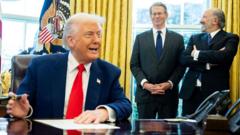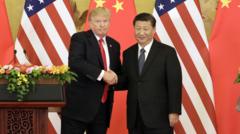The article discusses President Trump's recent announcement of a 90-day tariff pause for approximately 60 nations amid market turmoil, coupled with significantly increased tariffs on Chinese goods, reflecting escalating trade tensions.
US Halts Tariff Increases for Most Countries Amid Market Instability, Escalates China Tensions

US Halts Tariff Increases for Most Countries Amid Market Instability, Escalates China Tensions
In a surprising shift, President Trump suspends proposed tariff hikes for countries that haven’t retaliated, while intensifying trade strains with China.
In an unexpected policy pivot, President Donald Trump declared a 90-day suspension of tariff increases for most countries following a week of significant market instability. Just hours after higher tariffs were enacted against around 60 trading partners, Trump authorized a universal "lowered reciprocal tariff of 10%" as he continued to negotiate trade terms.
However, tensions with China have escalated sharply, with Trump imposing a staggering 125% tariff on Chinese imports, citing Beijing’s "lack of respect" in response to earlier tariffs. This move coincided with China’s announcement of an 84% tariff on American goods, intensifying the ongoing trade conflict between the world’s two largest economies.
Last week, Trump initiated import taxes on all goods entering the United States, marking a seismic shift in international trade relations. This plan included a base tariff of 10% on all imports but specified higher tariffs for countries deemed "worst offenders" regarding unfair trade practices, such as the 27-member European Union and several other nations.
After the implementation of these tariffs, global markets experienced severe disruption, resulting in trillions in losses and intensified fears of economic recession among Americans. Following Trump's directive to pause the higher tariffs on non-retaliating nations, the US stock market rebounded dramatically, with the S&P 500 surging 7% by the afternoon.
Trump announced the tariff changes via Truth Social, aiming to reassure US trading partners and hinting at future negotiations. Treasury Secretary Scott Bessent asserted that the policy alteration was unaffected by market fluctuations, while senior Democrat Chuck Schumer accused Trump of "reeling and retreating."
In his remarks outside the White House, Trump emphasized that the amendments were necessary as "people were getting yippy," insisting that a fair trade environment would eventually emerge from the ongoing disputes. He expressed optimism about the potential for a diplomatic resolution with China.
Conversely, China expressed strong opposition to the increased tariffs, with a Foreign Ministry spokesman denouncing the US's actions as abusive. The continuing standoff risks a significant reduction in trade volume between the two nations, with economic forecasts predicting a potential $466 billion downturn in goods trade, according to the World Trade Organization.
Despite these shifts, existing tariffs, including a 25% tax on vehicles and a further 25% on steel and aluminum imports, remain unchanged. Meanwhile, the European Union has move forward with retaliatory tariffs set to launch mid-April, although the US's recent changes have exempted them from immediate higher tariffs as negotiations are ongoing.
As markets and global economies brace for the repercussions of these developments, the spotlight remains on the intricate relationship between the US and China and the potential for a resolution amidst increasing economic tension.























